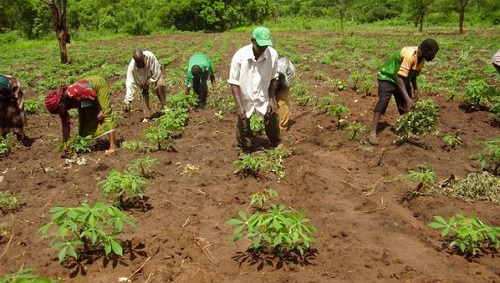A total of GH¢2,664,789 was spent on subsidized fertilizer and improved seeds under the Planting for Food and Jobs (PFJ) programme between 2017 and 2021.
However, the value of production over the period under review stood at almost GH¢50bn from a total production output of 14,973,000 metric tonnes (MT).
Investment
In an interview with the Daily Graphic, the Minister of Food and Agriculture, Dr Owusu Afriyie Akoto, while describing the flagship programme as “a big success”, said the investment by the government was not a waste.
He said it was clear that investing in agriculture could change the fortunes of the country because “if we spent a little over GH¢2.5 million with a return of almost GH¢50bn, surely that is the best investment”.
Dr Akoto said, for instance, that 2021 had the highest production of 4,338,000MT, with a production value of GH¢21,085,179, although the subsidized fertilizer was low, compared to that of 2018 to 2020.
In 2021, a total of 239,096MT of fertilizer and 34,291MT of seeds were distributed to the farmers.
Dr Akoto said the output of the PFJ was a clear indication that agriculture could be the major driver of the national agenda to transform the economy.
Annual breakdown
Giving the annual breakdown, he said when the programme was launched in 2017, only 121,000MT of fertilizer and 4,400MT of seeds were distributed to farmers.
He said with that, the farmers were able to produce 747,000MT of food, with a production value of GH¢1,619,273,000.
“In 2018, we invested 247,039MT of fertilizer and 6,822MT of improved seeds and realized 2,313,000MT of food, with the face value of GH¢5,087,894,000,” the minister said.
He added that for 2019, 331,354MT of fertilizer and 18,204 MT of improved seeds were distributed among the farmers, whose total output stood at 3,4436,000MT, valued at GH¢9,732,277,000.
The year 2020 received the highest subsidized fertilizer of 424,000MT and 29,500MT of improved, yielding 4,139,000MT, valued at GH¢12,125,122,000.
Enthusiasm
Dr Akoto explained that the PFJ generated a lot of enthusiasm among a cross-section of the population, especially the youth, who until then considered farming to be for the aged and the illiterate.
He said not only individual farmers signed onto the programme but that churches and tertiary institutions also joined.
Citing the 2021 investment and the output, the minister said even though the two commodities, fertilizer and the seeds, were the game changers, more improved seeds were needed.







